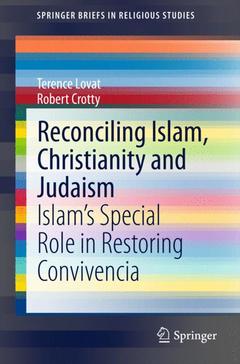Description
Reconciling Islam, Christianity and Judaism, 2015
Islam's Special Role in Restoring Convivencia
SpringerBriefs in Religious Studies Series
Authors: Lovat Terence, Crotty Robert
Language: English
Subject for Reconciling Islam, Christianity and Judaism:
Approximative price 52.74 €
In Print (Delivery period: 15 days).
Add to cart137 p. · 15.5x23.5 cm · Paperback
Description
/li>Contents
/li>Biography
/li>Comment
/li>
Section A: The Abrahamic Religions (Islam, Christianity and Judaism) and a Theory of Religion.- Chapter 1: An Introduction to the Abrahamic Religions.- Chapter 2: A Theory of Religion and Being Religious.- Section B: The Sacred Story(ies) of the Abrahamic Religions from Three Vantage Points.- Chapter 3: The Story from the Vantage Point of Judaism.- Chapter 4: The Story from the Vantage Point of Christianity.- Chapter 5: The Story from the Vantage Point of Islam.- Section C: Islamic and Islamist Scholarship and the Abrahamic (Ibrahimic) Tradition.- Chapter 6: The Heart of the Ibrahimic Story in Islam.- Chapter 7: The Increasing Cogency of Islamism.- Section D: Exploring Convivencia and the Potential for Islamic Leadership.- Chapter 8: The Historical Exemplar: La Convivencia.- Chapter 9: Re-constructing Convivencia in the Twenty-first Century.- Conclusion.
Tells the story of Islam that Westerners (and many Muslims) rarely hear
Shows how peace and accord with Islam was once achieved and can be achieved again
Prioritizes Islam’s role as a potential leader among the Abrahamic religions and in inter-faith dialogue generally
Includes supplementary material: sn.pub/extras

